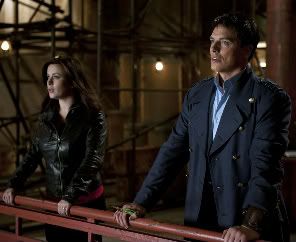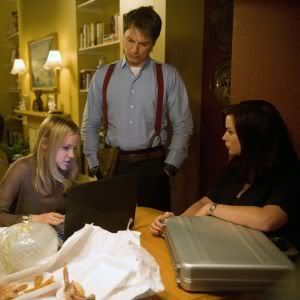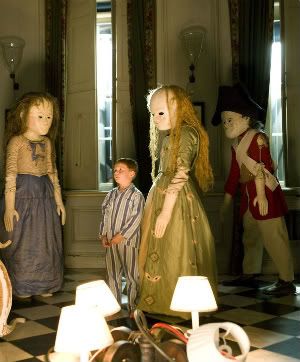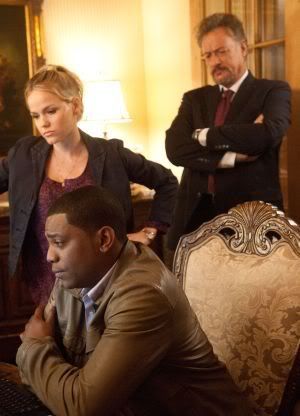Torchwood: Miracle Day - The Blood Line
Thursday, 15 September 2011 - Reviewed by Chuck Foster

Torchwood: Miracle Day - The Blood Line
Written by Russell T Davies and Jane Espenson
Directed by Billy Gierhart
Broadcast on Starz - 9th September 2011
Broadcast on BBC1 - 15th September 2011
BBC Worldwide Productions
A series finale generally takes two forms: the purpose of the first type is to wrap up the threads that make up the ongoing plot of that series; the second is to set up the cliffhanger of an ongoing series. In both cases, the aim is to reach a climax, with the former consolidating into the resolution, whilst the latter building up to leave you with the big reveal "to be continued" ...
So where does Miracle Day fit? The answer is a little unsatisfactory in both camps.
One storyline's solution was inevitable since day one of course - it was clear the Miracle would be resolved and everybody would return to mortality; however, it wasn't so clear how that resolution would be achieved, even by episode nine, and about all we could be certain of was that Jack would be involved in some way. Ultimately this was indeed the case, the Miracle is reversed and everything is back to as normal as it could be.
However, then we have another few minutes to spare, where we discover that the whole Miracle is a "trial run" and the Family are simply off to run their "Plan B". To me, this simply had the effect of cheapening the ten week run, cheapening the deaths of Vera and Esther, and generally ending up with the feeling that the whole plot was a waste of time.
But hey, this has suddenly moved us into cliffhanger territory, and lo and behold we get it in the form of Rex Matheson joining the immortality club courtesy of him actually having a useful purpose for once in the series, as Jack's blood bank earlier in the episode!
Before I go any further, let me just point out that though I found the resolution of Miracle Day generally disappointing, when watching I was perfectly gripped by the climax build-up, the way it was executed, and the ending truly was a WTF moment, so the episode accomplished its task as televisual entertainment in that respect!
Let's get my biggest gripe out of the way first - just why was Esther killed off? In Children of Earth, Ianto's death was an integral part of the storyline as Jack sees the person closest to him die, with him totally impotent to stop it from happening. But, whilst it is arguably an important part of the plot for Miracle Day to have Vera 'die' (and thus bring to light the true meaning of Category One - not that this mattered by the time we reached last week's episode), with Esther it was simply an arbitrary shooting by a secondary character, had no impact on the conclusion of the Blessing plot at all, and being she did survive after the Miracle ended, there was no actual need to kill her off at all! The funeral scene didn't actually bring anything more to the story, and Rex's discovery of Charlotte's duplicity could have been set anywhere. Instead, it just feels like killing a character off for the sake of it. Some reviewers have commented that this is "the Torchwood way" and that it wouldn't be the show if a main character wasn't killed off ... I don't agree at all - deaths happen, yes, but they should be intrinsic to the plot - there is a difference between someone dying in a noble way and simply being written out lazily like here.
That aside, all of the characters came to life in this episode in a way I wish they'd done so in previous episodes. Rex finally proved why he was in such an important position in the CIA, and the plan concocted by him and Esther to hide Jack's blood within him was inspired (though let's not dwell too much on the actual mechanics of transfusion and why the directors of 28 Days Later abandoned such a plan in that film!). The Family members we saw on screen seemed confident, competent and convinced in their plans, at least until the above revelation ended their grand scheme, and Jilly's mad enthusiasm for their cause and what she sees as salvation was captivating, and after my misgivings over her character in earlier weeks, I am actually happy she did survive the explosion in the end to come back another day.
And then we have Oswald. For a moment there I thought there was going to be a revelation about who/what Susie Cabina really was and why he had to catch and kill her - i.e. a secret that a tortured man had to hide even to his (original) death and had only just found a man from the future that he could confide in. But no, he was exactly how he had been portrayed, a thoroughly despicable child killer with no sense of remorse, and Jack took him down a peg when he said about the universe: "I wish you could see that Oswald ... cause then you'll know how small you've made your life". This later made for a strange juxtaposition between what Oswald might consider 'heroism' in his sacrifice at the end and his seeming wish for redemption through that act, versus his warped sense of purpose in wanted to continue his 'passion' for the hunt of Susie and her ilk echoing on as he is finally engulfed in mortality.
Then the Cooper clan and their loss of Geraint was sensitively handled, with Rhys for once coming across as a sympathetic person and not the "noisy hulk" he normally comes across as. And I was pleased to see Andy Davidson having his role to play, and also that his seemingly prophetic words at the start - "she'll be the death of me" - didn't come to fruition after all - phew!
The "she" of the last sentence was of course Gwen, and once again the interplay between her and Jack as their friendship is put to the limit was portrayed brilliantly by Eve and John; the foreshadowing of this was laid down in Immortal Sins, and seeing Gwen taking the responsibility of what would effectively be the death of her friend was one of the best scenes of the episode, if not the series. And as for that 'death' ... in some ways it would have been a brave move to have actually killed Jack outright, turning this act into a noble sacrifice to save the world (another "Doctor" trait he's picked up over the centuries - could you imagine the young dashing conman from The Empty Child doing such a thing?), but then again I would like to see further adventures with the mysterious time agent (like actually exploring why he has a two-year gap in his memories!) so I'm not so fussed about it!
Reading through the above, you're probably hard-pressed to work out why I wasn't so enamoured of the ending (Esther notwithstanding). Well, it isn't the characterisations that I had a problem with, it's more the actual plot threads and pointlessness of a number of them. Take, for instance, the big fuss in End of the Road as to how the Null Field panels from the Hub seemed to be so important to the resolution of Miracle Day, given their influence in the death of Angelo. Jack taking the alpha plate was seemingly signposted as vital to the resolution - but that's the last we hear of it! I thought the Soulless were to be important in some way (maybe as Oswald's followers) but they were just a one-episode wonder - in fact there are so many of these 'dead-end' signals in the show it could almost have been ten separate episodes with a common thread to lead to the finale (like "Bad Wolf") rather than an integrated progressive storyline leading to the resolution.
And the Blessing itself is still something that almost broke my suspension of disbelief in the series. As a concept it was an interesting idea, but this was basically a re-hash of the Gaia principle (though I suspect the CGI renderers took the idea of "Mother Earth" a little too literally in their representation of the Blessing on screen, ahem!), and the sci-fi trapping of a hole through the diameter of the Earth was written off with a simple "we don't know" when Jilly asks the question we're all wondering at home - where's the lava?!! Jack makes a comment about it being it being "the gap in between" and then off into a load of Doctor Who Silurian/Racnoss pseudo-explanation that Gwen quite rightly says "you don't bloody know, do you?". A clever thing might have been to make this related to the rift in Cardiff and making the end point Campbell Island (that's no worse than Shanghai and Buenos Aires, if a little less glamorous!) and that would have tied in nicely with the Null Field, but alas it was not to be. So we end up with a strange natural phenomenon that was dug up, fed with Jack's immortal blood until it went doo-lally, but fixed with something around just 16 pints of Jack's now mortal blood!
Not wishing to end on a low note, there were other highlights to the episode, like the lovely scene with the shop owner in Shanghai comforting Gwen after she found the Blessing, Oswald calling Gwen magnificent, Gwen and Jilly's fight in the lift, and of course that brilliant moment when Shapiro discovers who the traitor in their midst really is - his singular response is one that almost steals the episode for itself!
All-in-all, this is a series that I haven't actually disliked, but just haven't been able to totally enjoy either. It's had some really good moments, but also some downright boring ones, too (I'll look at the overall series itself in a future post). For The Blood Line itself, though it has some really frustrating plot elements, overall I enjoyed it on viewing and feel this is one of the strongest episodes of the series.
And as the finale, quite right too!
Okay, I confess, I am still frustrated at Esther's wasted opportunity to have further adventures with Jack!!!


 As we reach the end of the ten-episode epic the resolution of the titular central plot-line is probably obvious to everybody, but as one might expect from the twists and turns of previous Torchwood storylines the journey to that resolution and emotional angst encountered along the way is never going to be so simple.
As we reach the end of the ten-episode epic the resolution of the titular central plot-line is probably obvious to everybody, but as one might expect from the twists and turns of previous Torchwood storylines the journey to that resolution and emotional angst encountered along the way is never going to be so simple.









